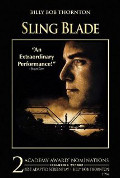
Directed by
Billy Bob Thornton
135 minutes
Rated M
Reviewed by
Bernard Hemingway

Sling Blade
Billy Bob Thornton’s directorial debut, adapted by him from his own play was deservedly a hit in its day thanks to Thornton’s remarkable lead performance as Karl Childers, a simple-minded individual who has been sequestered in a state institution since childhood when he murdered his mother and her lover. As the film opens he is just about to be released and we follow his adventures as he returns to his hometown, gets a job fixing small machines, and befriends a young fatherless boy, Frank (Lucas Black).
Owing much in sensibility to To Kill A Mockingbird (a debt acknowledged in the casting of Robert Duvall, who had played Boo Radley in that film, as Karl’s father), Sling Blade belongs squarely in the tradition of stories from the Old South with its Biblical fundamentalism and inward-looking (and one might say, inbred) ways that have yielded particularly rich results for American film.
Although Thornton does a solid job directorially, dramatically the film is too driven by the plot to convince deeply - one is surprised that Frank 's mother (Natalie Canerday) would so readily leave her son alone with Karl, and if that decision is based on good-heartedness that she would neatly divide herself between an abusive boyfriend (country singer Dwight Yoakam) and a very gay best friend (John Ritter). These are all thinly disguised devices used to fulfill narrative requirements.
What is exceptional about the film is Thornton’s portrayal of Karl. Karl is such a brilliant creation one feels that Thornton must have based him on a real life person (apparently not) and Thornton disappears so entirely into the character that it makes Dustin Hoffman’s Oscar-winning performance as an idiot savant in Rain Man look histrionic in comparison (Thornton was Oscar-nominated but lost to Geoffrey Rush’s mentally-challenged pianist in Shine).
Want something different?





